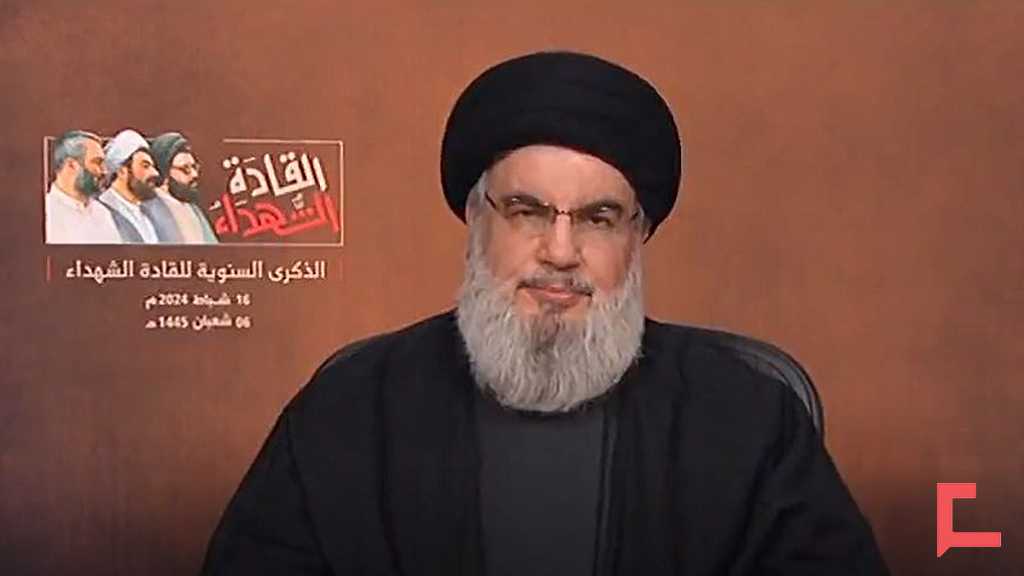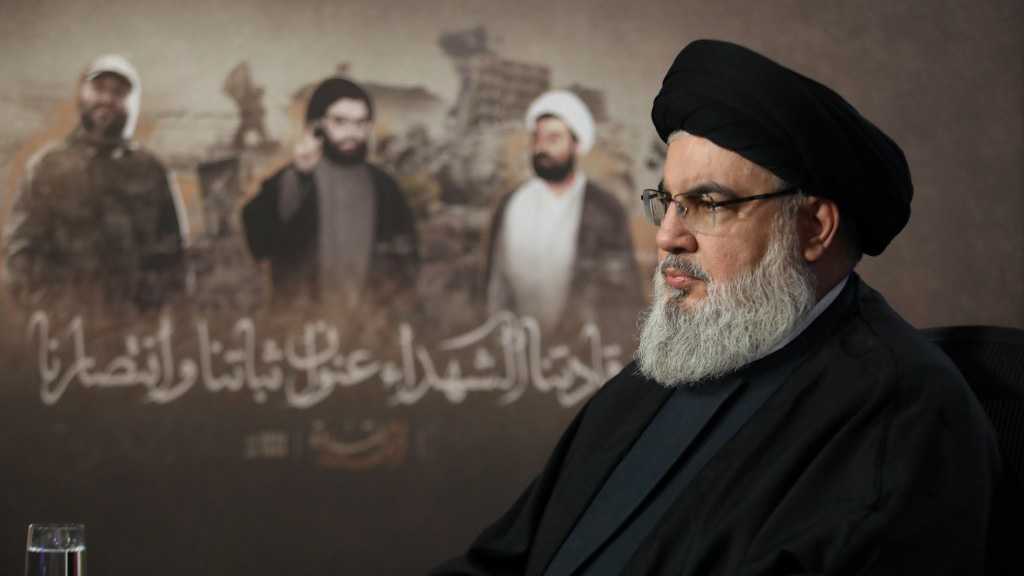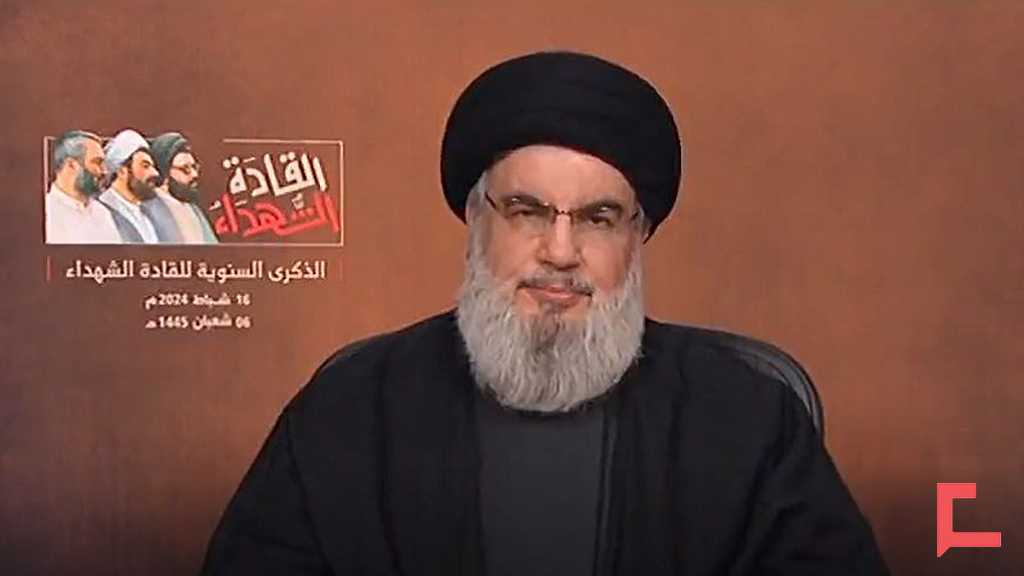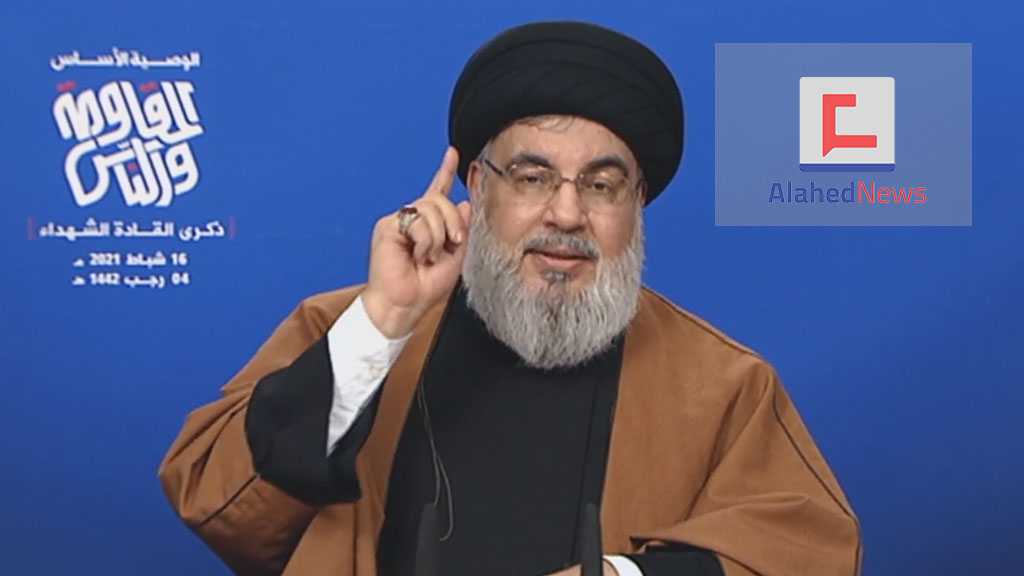
Hajjah Saada Badreddine Mughniyeh to Al-Ahed: In God’s Eye, I Saw Nothing but Beauty
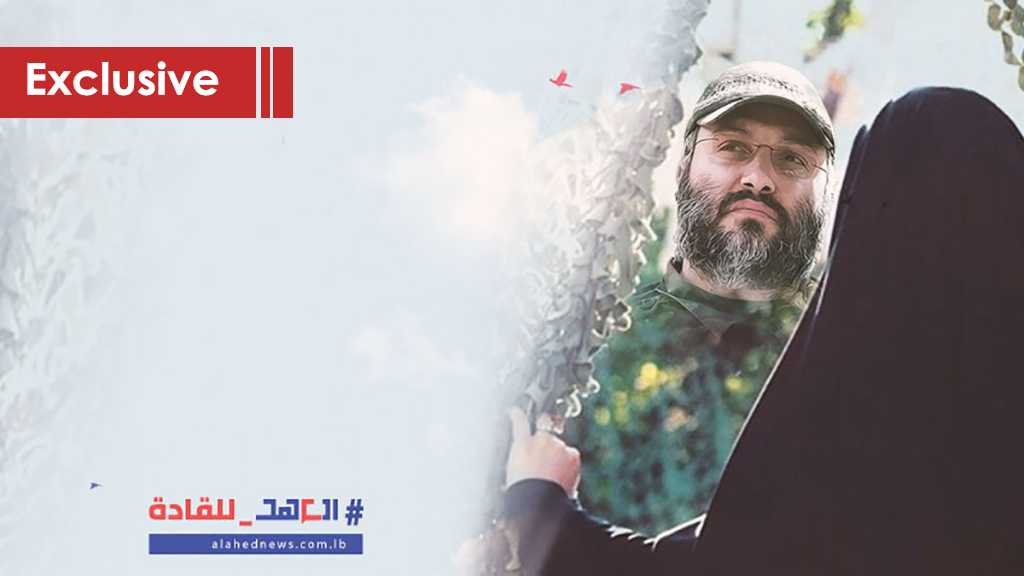
By Al-Ahed News Team
Hajjah Saada Badreddine is puzzling. She doesn’t hail from the world of philosophy or the world of knowledge and thinkers. Perhaps she is a combination of all of these worlds.
There is no journalistic flattery in this description, nor is there a lot of creativity. The wife of [Hajj] Imad is similar to him, exceptional. In Hajjah’s house, there is an unmatched tranquility. She conceals her tears as she welcomes people to her living room. Here, the martyrs are present. There is a large picture of the great jjihadi leader Hajj Imad with his son, martyr Jihad. There is another picture that adorns the wall, that of martyr Sayyed Zulfikar. A third picture was recently added – that of martyr Qassem Soleimani, the master of the martyrs of the resistance axis.
She is a woman of many traits. She is often referred to as the mother of the martyr, the sister of the martyr and the wife of the martyr. With composure, she holds a picture of Jihad smiling. She recollects memories with Sayyed Zulfikar, her closest brother. But she is overcome by the lump in her throat when she mentions the name Imad, despite the fact that it’s been twelve years since his martyrdom.
She is a unique woman. Her husband Imad as well as her brother Zulfikar are both martyrs. She proudly proclaims, “We did not wash Jihad." She had courage to tell us why, but we lacked the courage to write it. We were thinking about her immense degree of patience. Was this a human trait or did it come from God?
Hajjah Saada knew Hajj Imad from his visits to their house. He was a friend of Sayyed Mustafa Badreddine. She saw in the young man a revolutionary who thought, planned and then implemented that plan. When they got married, Hajj Imad did not have any of the requirements expected for present-day marriages. He did not even have the financial capabilities to rent a house. For years, she lived with him in a room in the family house of Hajj Imad. As for the rest of the years, they spent it with their children, moving between work centers (the jihadi work of Hajj Imad), from one center to another.
Hajjah Saada speaks to her guests with a lot of kindness even with those she is meeting for the first time. She spent years detached from a regular social life that most families enjoy. But she still mastered the art of entering people’s hearts without asking permission. She invites us into the room of her martyred son Jihad. Everything is in its place. As if Jihad was just there. Even his prayer rug is still in the corner of that warm room, waiting for his return.
Her longing for Hajj Imad, her life companion, is still unique. She cries more than once when mentioning his name, and repeats, "I do not cry and mourn him because he is a martyr. I cry for him because, praise be to God, he knew the way to reach God."
"He was not a person who gave advice directly. He did not educate others through the use of words. His manner towards his jihadist work, which I had closely examined throughout his career, was more profound than words and advice. It was a practical will,” she recalls.
As for the bitterness of separation from loved ones, the abundance of longing, and the long march of patience, she sums them up by quoting the school of Sayyida Zainab (PBUH): "In God's eyes ... I saw nothing but beauty."
Below is the transcript of the first interview conducted by Al-Ahed news with Hajjah Saada Badreddine, the wife of martyr Imad Mughniyeh:
1- Tell us about the beginning of the journey of Hajjah Um Mustafa with Hajj Imad? Where did it begin?
There wasn’t much distance between the homes of the Mughniyeh family and the Badreddine family. It was the same distance that separated the two mosques – the Chiyah mosque and the Imam Zain al-Abidin mosque in Ghobeiry. The two houses were beside the two mosques. The Chayah mosque, whose imam was Sheikh Muhammad Qubaisi, was very close to the house of the Mughniyeh family. Meanwhile, the Ghobeiri mosque, whose imam was Sheikh Awwad, was adjacent to the house of the Badreddines. At that point, the two mosques were frequented by young men who wanted to make a difference, especially since the prevailing tradition at the time was that mosques were only attended by the elderly, and young men had no business there.
The young men met spontaneously over a simple goal, which posed a challenge to the prevailing customs. This goal brought together the pioneers of the two mosques, among which were Imad Mughniyeh and Sayyed Mustafa Badreddine. This acquaintance between the two young men led to mutual visits, and during one of Hajj Imad’s visits to our home in Ghobeiri, I got to know him. I met a young revolutionary man who thought, planned and then implemented that plan. Like my brother Sayyed Mustafa, he saw things from a different perspective than that of their peers. This simple goal that the young men sought to accomplish grew as they were faced with increasing challenges, including the civil war, the victory of the Islamic Revolution in 1979, the martyrdom of Sayyed Muhammad Baqir Al-Sadr in 1980 and the invasion of Beirut in 1982. All of these made the young men pioneers in facing these challenges and seizing opportunities.
2- What did Haji Imad own at the beginning of your marriage?
When we were getting to know one another, he had nothing. We got married and moved directly to Iran where I lived with one of the Lebanese families there because Hajj Imad did not even have the financial capacity to rent a house.
When we returned to Beirut, our home was the balcony of his parents' house in Chiyah. It was fixed in a way to be habitable. That room was my house until after the birth of my daughter Fatima. After the birth of my eldest son, we began moving around with him from one work center to another.
He continued to change his workplace for several years until we finally settled down at his final place of work between 2000-2006. By that time, I already had Jihad. We spent 6 years in our last place of residence, and those were the most stable years, until the July 2006 war broke out. The nature of his work forced us to move with him constantly to maintain his security. We experienced hardship due to the circumstances imposed on us as a family, which included none of our relatives coming to visit us. But we still felt a sense of responsibility towards him not only as a husband and father, but also as a leader.
3- What can you tell us about the beginning of his jihad and the long journey of patience?
We all know that life is a struggle. The philosophy of affliction is to fight life in order to know it and know ourselves. Religious literature and the literature of the Prophet’s Household (PBUT) call on us to be patient with these misfortunes in order to attain a degree of humanity that God has honored us with. I recall the words of my husband, Hajj Imad – the most important component in all jihadi equations is the human being. Each of us must be aware that for man to progress, he must achieve his humanity on this earth. From the first moment I got married, I realized that I was on a difficult and thorny path. After that, I identified my role and mission. I chose to continue because I believed that this was the road to perfecting myself as a human being.
And that was a conviction that was rooted deeper every time we overcame an affliction that befell us as a family, without taking into account the reasons and intensity of this scourge. We grew to know that Hajj’s life was complicated because of his jihadi work. The circumstances required that we live with him in the shadows as he lived. This way of life had its own characteristics: We could not identify ourselves using real names, disclose our relationship with him or reveal his name. We were continuously on the move. Relatives and neighbors were not allowed to visit us. We did not have our own house as I mentioned earlier.
4- How was Hajj Imad's sincerity reflected in his work? What were his recommendations to his family?
Hajj Imad was known for being quiet from a young age. And this was confirmed by his late mother, Hajjah Um Imad. This is also what I saw during my marriage. He never talked about anything related to his jihad work during our family gatherings. He was kind and funny. And he was always distracted. I knew he was constantly thinking about his work. His entire life, Hajj never separated himself from his work. Every shred of his soul and body was work.
During our family gatherings, when he learned something new or something grabbed his attention, I automatically knew that he was thinking of investing this newly acquired knowledge in his work even if we regarded it as simple and normal. He had love, which was blended with intelligence and foresight. He also had this ability not to attribute any of the resistance’s achievements to himself. This I cannot grasp, but it is a special gift granted to him.
He never had difficulty being discrete. It was part of his nature. He did not acquire it as a skill due to the peculiarity of his security work. Sincerity is the result of a daily behavior and persistence in repeating Dhikr [short phrases or prayers]. He asked me to search for prayers to help him perform his work, and I searched and inquired. I even suggested he recite prayers when I saw him fatigued, and he recited them.
He was not a person who gave advice directly. He did not educate others through the use of words. His manner towards his jihadist work, which I closely examined throughout his career, was more profound than words and advice. It was a practical will. His priority was ‘to give’ in order to preserve this resistance and for it to continue to thrive. And this was the distinguishing quality of the resistance’s martyred leaders. Sayyed Abbas Al-Mousawi clearly expressed the conviction of Hezbollah in his final speech before his martyrdom – "the main will is to preserve the resistance".
5- Could you please reveal some of his traits as a husband, a father and a leader?
He was a servant not only in worship, but also toward his nation and all the oppressed. He harnessed himself, his soul, mental abilities and physical skills for his nation and for the establishment of the truth. He was not a traditional husband and father. He did not have specific time with the family that was calculated. But when he attended our family gatherings, he was friendly and often laughing. He shared our spontaneous moments, interacted with us on general or personal topics. While we spent time with him, we never felt the burden of the responsibilities he carried.
6- How do you prefer to be addressed – the wife of martyr Imad, the sister of martyr Zulfikar or the mother of martyr Jihad?
Labels are nothing compared to martyrdom. I am a ‘good servant’. God has granted me the blessing of life to accompany these martyrs: my husband, my brother and my son, in different stages of their lives for them to obtain martyrdom.
7- What are the most difficult and most beautiful experiences you had on your journey of jihad with Hajj Imad?
In God’s eyes, I saw nothing but beauty. I even thought that the most difficult experience was beautiful. I think the most difficult experience we had as a family during those years was waiting for him to come back home every time. The best experience was when he came home every single time.
8- How did His Excellency the Secretary-General express his condolences to you for the martyrdom of Hajj Imad, martyr Jihad and Sayyed Zulfikar?
Sayyed Hassan Nasrallah made no exception when he expressed his condolences to us. He offered us consolation the way he would with all the families of the martyrs. When it came to the martyrdom of my son Jihad, I asked him a direct question about how he was martyred. He replied to me, "I envy him on this martyrdom."
9- Can Hajjah Saada tell us about the food episode and her first encounter with Hajj Qassem Soleimani during the July 2006 war?
During the July 2006 war, I used to meet Hajj Imad and get him his Iftar meal because he was fasting during the entirety of the war. Before the year 2006, I did not know Hajj Qassem Soleimani. But one day during the war, I had agreed to meet up with Hajj to give him food. Hajj arrived on a motorbike with another person. When he took the food from me, he asked me to greet the person accompanying him. So, I greeted him, and that was the first time I saw Hajj Qassem. Our relationship with Hajj Qassem was strengthened later after the martyrdom of Hajj Imad. But before that, there was no personal acquaintance.
10- Is it true that Hajj Soleimani asked Hajjah Saada to pray for his martyrdom?
Two months before his martyrdom, Hajj Soleimani asked me to pray for him to attain martyrdom similar to that of Jihad. And I prayed for him repeatedly.
11- What message does Hajjah Saada have for the youth of Hezbollah and their leader?
Thank you for the sacrifices. I thank them for giving us the opportunity to be part of their jihad and stand beside them. I thank them for the experience, knowledge, strength and the pride they gave us. The human experience that we shared with them is unique and exceptional. This experience, according to our religious and ideological understanding of this universe, has its rewards in the afterlife.
I tell them that the presence of His Eminence, Sayyed Hassan Nasrallah, as a scholarly figure among us at this time, is a great opportunity that we should invest in, be keen on, know and always be thankful for. Hajj Imad’s most prominent trait was creating opportunities and turning threats into opportunities. This was confirmed by the enemy and the martyrdom of a friend. And Sayyed Hassan Nasrallah is an opportunity for us as a nation to establish the truth and reject any injustice.
On the personal level, I am ready for any task Sayyed Hassan Nasrallah asks of me on this jihadi path.
Comments
